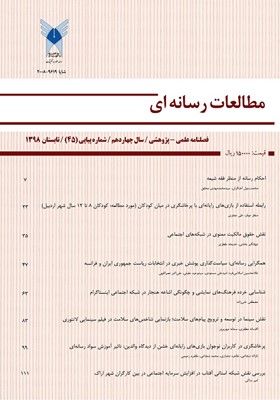احکام رسانه از منظر فقه شیعه
محورهای موضوعی : مدیریت رسانهمحمد رسول آهنگران 1 , سید محمد مهدی محقق 2 *
1 - استاد گروه فقه و مبانی حقوق دانشگاه تهران
2 - دانشجوی دکترای دانشگاه ادیان و مذاهب قم
کلید واژه: تشیع, فقه, رسانه, استفتاء, معاصر,
چکیده مقاله :
یکی از ادعاهای علماء و رجال مسلمان، کامل بودن دین اسلام است. آنها بر اساس متن قرآن مجید منبع اصلی این دین معتقدند این دین، قابلیت پاسخگویی به مسائل پیشروی مسلمانان و غیر مسلمانان را در هر زمانی دارد؛ با توجه به تغییرات سده های تاریخی، این پاسخ گویی در صورتی مقبول عامه قرار خواهد گرفت که تفاسیر و برداشت ها نسبت به مسائل مستحدثه مناسب و به روز شوند. از مهم ترین مسائلی که امروزه بشر با آن مواجه شده است؛ مسئله رسانه است. این مسئله و زوایای مختلف آن چنان فراگیر و گسترده شده که در همه ابعاد زندگی بشر ورود پیدا کرده و در کوچک ترین و شخصی ترین بعد نیز ردپای این مسئله به چشم می خورد. عالمان دین برای مواجهه متدینین خود با این مسئله، به استخراج احکام متناسب با آن پرداخته و تکالیف شرعی پیروان دین خود را برای آنها تبیین می کنند. عالمان و مجتهدان جهان تشیع نیز برای مسائل مبتلابه هم کیشان خود احکامی صادر کرده اند. احکام صادره این موضوع را می توان ذیل احکام خمسه به 4 بخش دسته بندی کرد. این نوشته به تشریح موضوع، استفتائات آن و جواب های در نظر گرفته شده برای این چهار بخش می پردازد.
One of the claims of scholars and religious scholars is the fullness of Islam. They are the main source of this religion based on the text of the Holy Qur'an believe that the texts of this religion, for all ages, are capable of responding to the progress of Muslims and non- Muslims. Of course, given the tangible changes of the ages and historical centuries, this accountability will be publicly accepted if inter pretations and perceptions are appropriate and up-to-date on the issues of justice. Undoubtedly, one of the most important and maybe even the most important issue that humanity faces today is the issue of the media. This issue and its various angles are so wide spread and perfect that it has entered in all aspects of human life, and in the smallest and most personalized aspect there is a trace of this issue. Religious scholars, in order to confront their faithful, deal with this matter, extracting the judgments appropriate to them, and explaining the religious duties of followers of their religion to them. The scholars and mujtahids of the Shiite world have given their answers to the questions of their peoples, which describes this issue and its intended answers.
_||_

